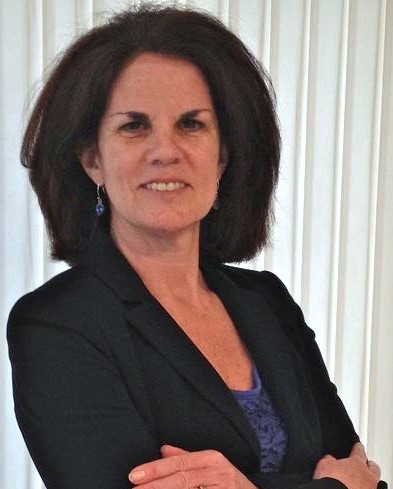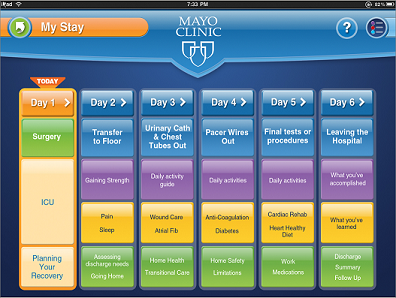A team of clinicians at Mayo Clinic designed an iPad app to help cardiac surgery patients and their families participate in the pre and post surgery process, creating a patient-sided driver of successful recovery.
Dr. David J. Cook, a Mayo Clinic anesthesiologist leading the Discovery Project team had personal inspiration for this application. “My mother had cardiac surgery and shared her experiences. As a patient gets ready for surgery, there is a tremendous amount of anxiety and uncertainty. We ran focus groups with patients and heard about the frequent disconnect between patients and providers about what to they can expect during the hospital stay. Patients may be poorly informed about what will happen over the course of a hospitalization or what they can expect any given day and it is difficult for patients to manage information and learn when they are under stress. With this iPad application, we clearly communicate what is happening today, what to expect during your stay, what patients need to know, and what a normal recovery looks like.”
The Mayo myCare iPad application displays a personalized “Plan of Stay” showing patients and their families what is planned each day. Specifically, the patient’s Plan of Stay is organized into four sections each day; “Clinical Milestones, “Gaining strength”, “Education” and “Planning my Recovery”. “In 'To Do' Lists, we give patients knowledge, self-assessments (i.e. pain level) and self reporting tools to facilitate and document their participation in their recovery plan. We can tell them how much to walk each day, ask them how much they walked and measure it remotely”, explains Dr. Cook. “We want to help our patients feel more in control and part of the process, as a partner with their care team. This significantly shifts the nature of the medical relationship as patients become more educated. They can now ask questions about any step in the surgery process because they are better informed”.
While in surgery, the myCare iPad is used by the patient’s spouse, child or other family member to better understand what to expect that day, thru surgery and upon discharge. “We worked closely with our discharge planners, social workers and therapists to recognize the barriers that patients and families face and developed modules to help drive critical conversations, such as the who, how and when of preparing for the patient’s needs when they leave the hospital. We identify barriers such as driving limitations or need for support with other daily activities. These are critical conversations to have and yet they often fly under the radar screen for physicians who typically focus on the specifics of surgical recovery,” emphasizes Dr. Cook.
The myCare iPad application presents clinicians with a care population and an “individual recovery dashboard” to monitor the patient’s progress through recovery. It aggregates data on the patient’s use of the education, recovery planning and self-assessment tools and provides alerts when patients did not, or were predicted to not, meet recovery expectations. The direct patient input and data aggregation enables providers to get an earlier look at progress and allows for rapid mobilization of resources to address patient needs. This was an important factor in reducing hospital length of stay in the patients using the program.
Pilot Success Measures & Evaluation
The Mayo Clinic iPad Pilot was conducted with 149 cardiac surgery patients from early February 2012 and through mid-November. Pilot patients ranged in age from 52 to 85 years old, with an average age of 69 years old.
One important success measure for Mayo is patient and family satisfaction. Mayo sent separate surveys to patients and their families and received an over 90% satisfaction rate. Questions were asked about the overall hospital experience, satisfaction with their care, but also how well informed they were and how easy it was for them to use the technology they were provided with. Even though this was an older population more than 80% of patients said felt very comfortable using the program after a day or two. Here are some of their comments:
The IPad was a valuable addition to overall patient care and provided a more confident “going home” feeling for us.
I would strongly recommend the MyCare IPad, it helped me to understand each day what to expect instead of the high anxiety of wondering if what my husband was going through was normal.
..is was very nice to see day to day what my Dad should be doing to recover from surgery so I can help him improve, also the knowledge that we had helped us figure out what step to take next
In addition to patient and family satisfaction, Mayo is measuring care quality, care cost and length of stay. “A principal driver in the care cost are the people resources required to support the patient. Acquiring and managing data in this way allows for the more appropriate and targeted use of personnel resources. One of our patient participants was a physician hospital administrator who indicated that his ability to do his own discharge planning assessment before surgery had the potential to more wisely use hospital resources and direct those valuable resources to other patients who needed them more. In fact he completed and scored his discharge planning assessment (with what is typically a provider tool) before he was ever seen by a discharge planner. This and other patient self-assessment tools such as daily mobility accomplishments, have implications about how we assign resources to patients based on their needs. With this app, we can now focus our personnel on patients with more need”, shares Cook.
Future Engagement Opportunities with iPad App
The Mayo iPad application currently supports the patient while in the hospital. Mayo has not moved this outside of the hospital because they are “proceeding carefully” and working through the privacy and security issues that come with moving data outside their firewalls. “Over the year, we are planning to address those issues so we can extend the iPad recovery support program 30 days post discharge to prevent readmission and in two years we are looking to support longer term care management.
We developed this iPad solution with patient education, self assessment and reporting and we are planning to extend this solutions into 5 or 6 different care areas in the near term”, explains Cook.” On the tracking side, we have already built in FitBit integration so that we know how much our patients are moving. In the future, we will enable the solution to be configured with remote monitoring devices for patients who are obese or have diabetes for example”.
Dr. Cook feels that this represents a new model for health care delivery. “Making patients knowledgeable, giving them the tools for self-assessment and setting expectations that they participate in their care is the model for managing health care in this country and bending the cost and quality curve.”
 educating consumers about health and wellness,
educating consumers about health and wellness,  family ehealth engagement,
family ehealth engagement,  mobile health application,
mobile health application,  patient ehealth engagement,
patient ehealth engagement,  personalization for health and wellness in
personalization for health and wellness in  Connected Health,
Connected Health,  Data Driven Health Engagement,
Data Driven Health Engagement,  Decision Support eHealth,
Decision Support eHealth,  Mobile Engagement Health & Wellness,
Mobile Engagement Health & Wellness,  Patient Decision Support,
Patient Decision Support,  Patient Engagement,
Patient Engagement,  Personalization eHealth
Personalization eHealth 



Reader Comments